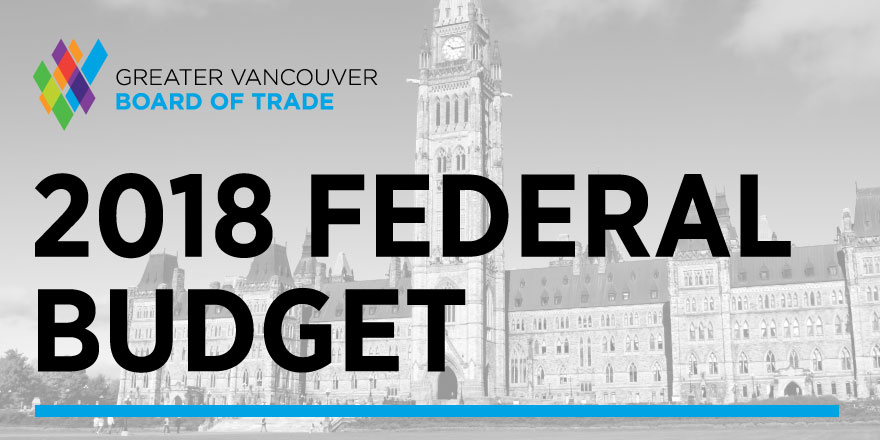Message from the CEO: Federal Budget 2018 Highlights

February 27, 2018
Dear Members,
The Greater Vancouver Board of Trade’s Policy Department has conducted a brief overview of today’s federal Budget 2018: Equality + Growth: A Strong Middle Class. In the coming days, our Government, Budget and Finance Committee will conduct an analysis of Budget 2018, assessing it against our priority areas.
The below four represent the principal themes in the Budget from the Board of Trade’s perspective as priority areas for the region’s business community.
Iain Black
President and CEO
Greater Vancouver Board of Trade
Fiscal Situation
While Budget 2018 manages to shrink the projected deficit to $18.1 billion from the Fall 2017 Update’s projected $18.6 billion, government has promised $21.5 billion in new spending yet does not set out a path to return to balanced budgets. On the back of a strong economy, Canada does continue to post a relatively low debt-to-GDP ratio of 30.4%, which is expected to fall to 28.4% by 2022-23.
Small Business Tax Changes
Following the Greater Vancouver Board of Trade’s #HitThePauseButton campaign which generated thousands of letters to Members of Parliament, government has now announced how it will move forward with small business tax changes. In Budget 2018, government proposes to move forward with taxing passive investments, however through a different mechanism than had been announced in July 2017.
The budget proposes to reduce (on a sliding scale) the amount of business income eligible for the small business tax rate. For Canadian Controlled Private Corporations (CCPCs) earning between $50,000 and $150,000 from passive investments, the eligible income decreases by $5 for every $1 of passive income above $50,000. Once a company passes the $150,000 threshold for passive income it will no longer qualify for the small business tax rate.
“Gendered Budget”
The federal government has positioned Budget 2018 as having a substantial focus on women, and the role of gender in the economy. There is no single flagship initiative, rather government has woven in gender-specific funding throughout the budget. Initiatives include funding for women in science and the trades, pay-equity legislation for federally regulated industries, and changes to paid parental leave.
Business Competitiveness
Budget 2018 includes $3.8 billion over five years to support scientific research in Canada. $600 million of these funds will go toward federal laboratories and programs. An additional $508 million over five years will be put toward cybersecurity initiatives, including a Canadian Centre for Cyber Security.
Despite the focus on science and research, the budget has little to no measures meant to make Canadian businesses more competitive on the world stage. In the face of tax reforms in the U.S. and the layering on of regulations and costs by all levels of government in this country, the Board of Trade remains concerned about the cumulative impacts on business.